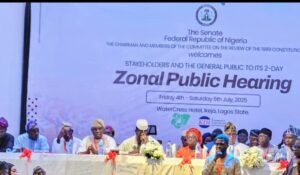

By Correspondent in Lagos.

The Muslim Ummah of South West Nigeria (MUSWEN) has reaffirmed its call for the establishment of Shariah Courts across all states of the federation, alongside far-reaching constitutional amendments, including power devolution, improved access to quality education, and protection of religious rights.
The advocacy was made during the South-West Zonal Public Hearing on the review of the 1999 Constitution, held on Saturday, in Ikeja, Lagos State.
MUSWEN’s position was formally presented in a memorandum and reiterated by its representatives,Tajudeen Balogun, Safiyullah Oladipupo, and Abdul Jeleel Olayinka.
In its submission, MUSWEN cited Sections 38 and 42 of the 1999 Constitution, which guarantee freedom of religion and prohibit discrimination based on religion, age, gender, language, or ethnicity.
The organization insisted on the co-existence of Shariah and conventional courts, asserting that certain aspects of Muslim life such as marriage, divorce, inheritance, and zakat cannot be effectively handled by conventional courts.
“Shariah Courts and Shariah Courts of Appeal should be established in all states to ensure equitable access to justice for all citizens, regardless of their location or religion,” MUSWEN stated.
The organization warned that subjecting Islamic personal law to the procedural framework of customary courts would be a misfit, quoting Supreme Court precedents that distinguish Islamic law from customary law.
It referenced a remark by the late Justice Niki Tobi, a devout Christian, who described Islamic law as “written, rigid, and divinely ordained,” unlike the flexible nature of customary law.
On federal structure and power devolution, MUSWEN noted the overburdened Exclusive Legislative List with 68 items and advocated that more responsibilities be transferred to the states or regions.
It proposed that Section 2(2) of the Constitution be amended to formally recognize the six geo-political zones, if not full-fledged regions.
It further recommended a resource control model akin to Section 140(1) of the repealed 1963 Constitution, which granted 50% of mining royalties to regions. MUSWEN proposed a modified version with 30% royalty remitted to the federal government.
Regarding local government administration, MUSWEN demanded full autonomy for local councils, urging the amendment of Section 7 of the 1999 Constitution to guarantee their independence under state supervision.
On the rights of women, the organization cited Quranic verses and insisted that the use of the hijab is protected under Section 38 of the Constitution. It described discrimination against Muslim women and girls in schools, workplaces, and public offices as unconstitutional under Section 42.
“It is strongly recommended that the Constitution be strengthened to protect Muslim women against discrimination, especially regarding dressing and the use of hijab,” the memorandum read.
Addressing education, MUSWEN urged that the right to qualitative education be moved from Section 18 to Chapter IV of the Constitution, thus making it a justiciable right.
It further proposed that public officials be mandated to enroll their children in public schools, which would compel government accountability in the education sector.
On qualifications for public office, the organization argued that basic education was insufficient, calling for a minimum of a first university degree or Higher National Diploma (HND) for aspirants to executive and legislative positions at all levels. It called for the amendment of Sections 65(2)(a), 106(c), 131(d), and 177(d) of the Constitution to reflect this.
The Senate Leader and Chairman of the Zonal Hearing, Senator Opeyemi Bamidele, assured participants that all memoranda would receive fair consideration and emphasized the importance of inclusive advocacy in the constitution review process.
Also speaking, the Lagos State Attorney-General and Commissioner for Justice, Mr. Lawal Pedro (SAN), commended the Senate for its fiscal reform bill, stating that it aligns with the Supreme Court ruling against the controversial State-Local Government Joint Account.
He urged lawmakers to either reinforce the Constitution to reflect the Supreme Court ruling or formally adopt it through legislation.
Pedro also addressed judicial reforms, recommending limits on the appellate court’s role in election petitions and suggesting mechanisms to fill judicial vacancies promptly when lower court judges are elevated.
In his remarks, Hon. Adeoye Stephen Aribasoye, Speaker of the Ekiti State House of Assembly and Chairman of the Conference of Speakers (South-West), raised concerns over arbitrary sack of presiding officers.
He called for standardized removal procedures similar to those for governors and the president and recommended a constitutional amendment empowering House Clerks to inaugurate legislative assemblies, rather than relying solely on governors.
Our correspondent reports that the public hearing also featured memoranda and presentations from the Nigeria Labour Congress (NLC), Nigeria Union of Local Government Employees (NULGE), National Council of Women Societies (NCWS), Nigerian Bar Association (NBA), student unions, Muslim Rights Concern (MURIC), and other civil society groups. Proposals for the creation of new states—including Lagoon, Ijebu, Ibadan, Oke-Ogun, and Ogbomoso—were also tabled.
Senators in attendance include Opeyemi Bamidele (Ekiti Central), Banigo Harry (Rivers West), Shuaib Afolabi Salisu (Ogun Central), Abdul Fatai Buhari (Oyo North), Olamilekan Solomon (Ogun West), Wasiu Eshilokun (Lagos Central), Idiat Adebule (Lagos West), Tokunbo Abiru (Lagos East), and Adeyemi Adaramodu (Ekiti South).
The public hearing, part of a nationwide exercise held simultaneously across Nigeria’s six geo-political zones,was also graced by traditional rulers from across the South-West.
Edited by Dada Ahmed.


